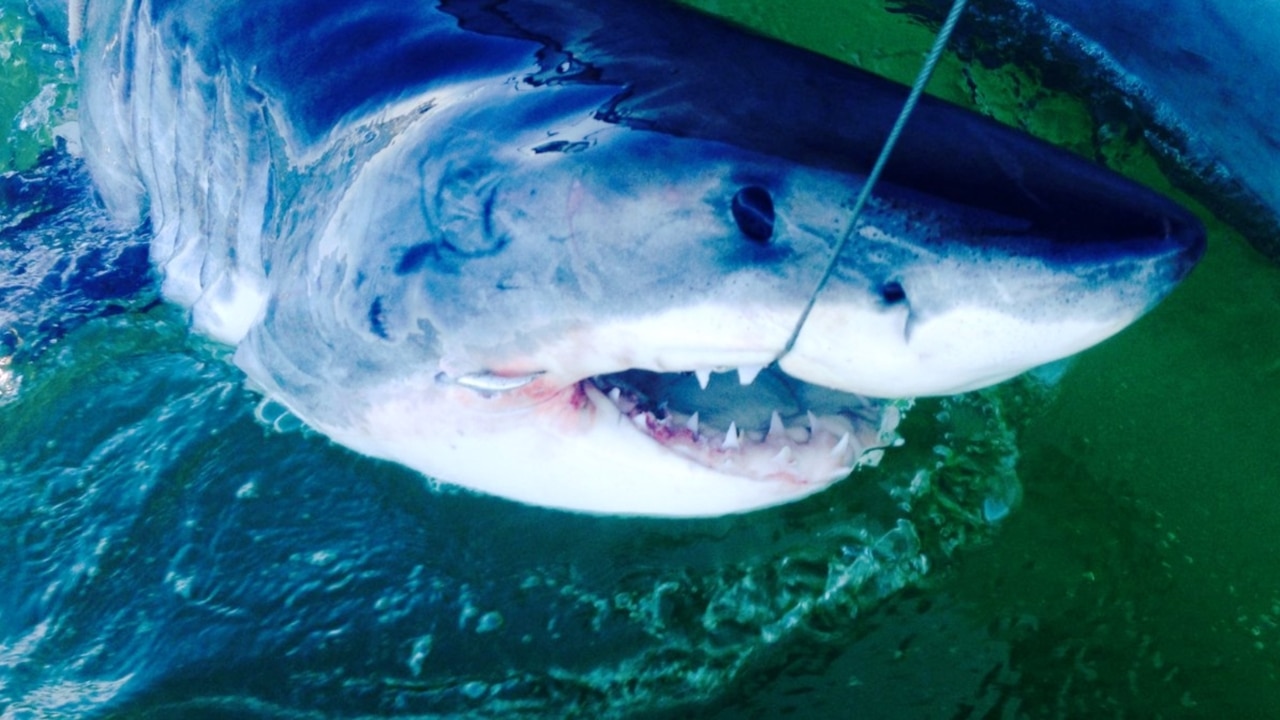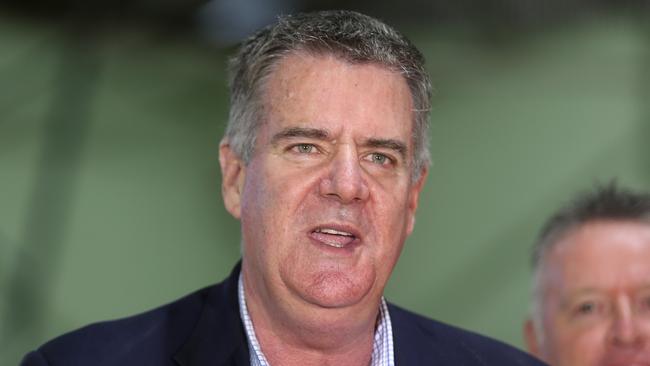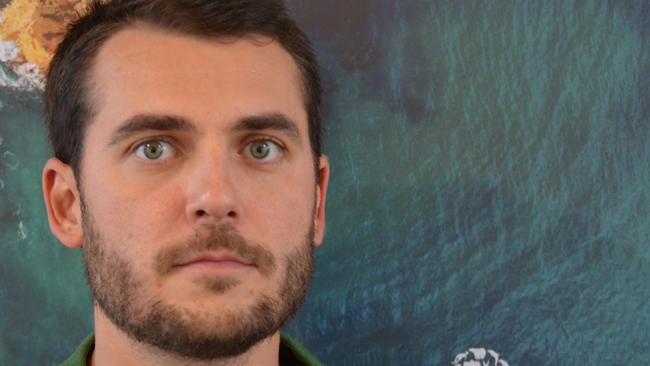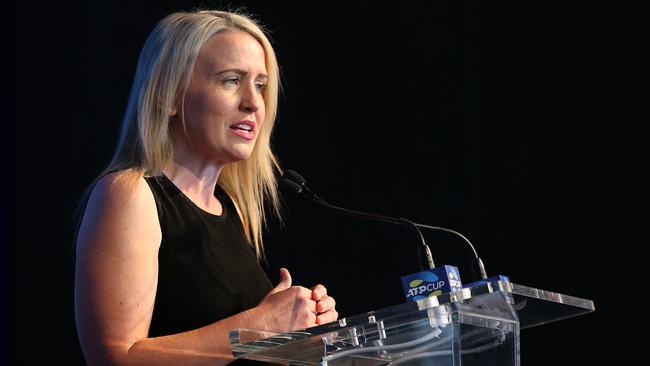State Government can no longer cull sharks on Great Barrier Reef
Drum lines will be pulled out of the Great Barrier Reef immediately after the State Government today lost an appeal against a decision to prohibit shark culling in the area, leaving dozens of beaches unprotected from the marine predators.

QLD News
Don't miss out on the headlines from QLD News. Followed categories will be added to My News.
DRUM lines will be pulled out of the Great Barrier Reef immediately after the State Government today lost an appeal against a decision to prohibit shark culling in the area, leaving beaches unprotected from shark attack.
Agriculture Minister Mark Furner said the Government was bitterly disappointed with its failed attempt to appeal an Administrative Appeals Tribunal ruling that will effectively end shark control at 27 beaches.

“Our advice is we do not have the grounds to appeal this decision,” he told Parliament.
“Queensland Government cannot immediately or safety comply with the conditions of the Administrative Appeals Tribunal and we will be working with the Great Barrier Marine Park Authority to discuss implementation of that decision.
“As a result of this decision, we will remove the shark control equipment from the Great Barrier Reef Marine Park.”
Mr Furner said the state’s shark control program, with drumlines and shark nets, would continue outside the marine park.
“Our Shark Control Program has an exceptional record dating back to 1962 and our Government stands by that record,” he said.
Mr Furner urged the Federal Government to legislate to allow Queensland to continue its controversial shark program in the marine park.
In a letter to the Federal Environment Minister Sussan Ley, Mr Furner said the decision by the Federal Court means the Government was compelled to remove the program’s equipment.
“This decision will see 27 beaches from Cairns to Gladstone no longer protected,” he wrote.
“It is now critical that the Commonwealth undertake urgent legislative change to allow the Queensland Government to return the program to Queensland’s waters within the park.”
The issue arises after the Humane Society International earlier this year launched a legal challenge aiming to stop the killing of sharks in the world heritage listed park.
It came after an updated license for the catch and kill program allowed 19 species of sharks to be euthanised if snagged on shark baits.
More than 170 government drum lines, at 27 separate locations were installed after being granted permission by Great Barrier Reef Marine Park Authority in 2017.
The environmental protection group applied to the Queensland Administrative Appeals Tribunal to have the Authority’s permission overturned, claiming it was inconsistent with laws designed to protect the reef and is leading to habitat destruction.
They also claimed the detrimental impact the shark culls are having on the reef’s ecosystem is not justified because there is no clear science to show the program actually reduces attacks.
The Humane Society won the case, stopping the Queensland Government, which has run a shark control program since 1962, culling sharks in the area.
The program largely used bait and hooks to lure sharks from swimming spots along the state’s coast.
In April, the State Government appealed this decision to the Federal Court of Australia, arguing the continued culling of sharks should be allowed.
The court today dismissed their appeal.
In its appeal, the State Government argued the Administrative Appeals Tribunal took an “unduly narrow approach to what constitutes evidence” and engaged more closely with the opinions of experts rather than the “non-scientific approach of the State” in finding that shark culling should cease.
“To act upon a belief that the so-called ‘scientific’ evidence trumped all other evidence simply because it could be so characterized, and so as to displace other kinds of evidence” was an error, the State Government had argued in their appeal.
But the Federal Court of Australia did not agree.
“We do not accept the applicant’s submission that in evaluating the scientific evidence, the Tribunal lost sight of the non-scientific approach or the objective fact as to the absence of fatalities,” the judgement published on Wednesday read.
“This is at best a complaint about the merits of the Tribunal’s decision-making.”
The State Government was also ordered to pay the Humane Society’s legal costs.

At the Great Barrier Reef, those deemed the most dangerous and likely to be involved in “human interactions” — largely tiger sharks — were previously euthanised every few days as the baits are checked.
The Humane Society argued during the original hearing “lethal aspect” of the current baiting project was “out of step” and no other state or territory in Australia uses a lethal program.
The court heard during the hearing there was only one shark fatality in the State in the past seven years, at Cid Harbour last year.
Marine campaigner Lawrence Chlebeck, from the Humane Society, said he was “ecstatic” about the win.
“It’s a massive victory not only for sharks but marine wildlife in Queensland and ocean-users in all of Australia,” he said.
“Drum lines will remain in place but no sharks will be shot and there will no longer be a target list of species.”
Mr Chlebeck said the system would required drum lines to be checked daily giving sharks a “better chance of survival”.
He said the case had sent policies around the area “out the window” and the decision affirmed the argument “shark culling does not increase swimmer safety”.

Mr Chlebeck said the Humane Society would be ready for any further challenges to the High Court but believed it would be a “folly” of the State Government to make a last-ditch bid to have today’s decision overturned.
“Sharks will no longer senselessly die for a misguided sense of security,” Mr Chlebeck said.
Tourism Minister Kate Jones said she was deeply concerned for the safety of Great Barrier Reef tourists following the court’s decision, claiming she was sure Scott Morrison didn’t want blood on his hands.
“Obviously we’re deeply concerned when it comes to the safety of tourists and visitors to the Great Barrier Reef by this decision, but I think … everyone should be mindful that this is federal legislation and I’m sure the Prime Minister Scott Morrison does not want to have blood on his hands,” she said.
“So obviously we’ll have a look at the decision.
“I know the tourism industry will be deeply disturbed by this decision today.”
Ms Jones called on Mr Morrison to intervene.
When asked whether it would deter people from swimming, the Tourism Minister said the State Government would have to “work through those issues”.
Originally published as State Government can no longer cull sharks on Great Barrier Reef


